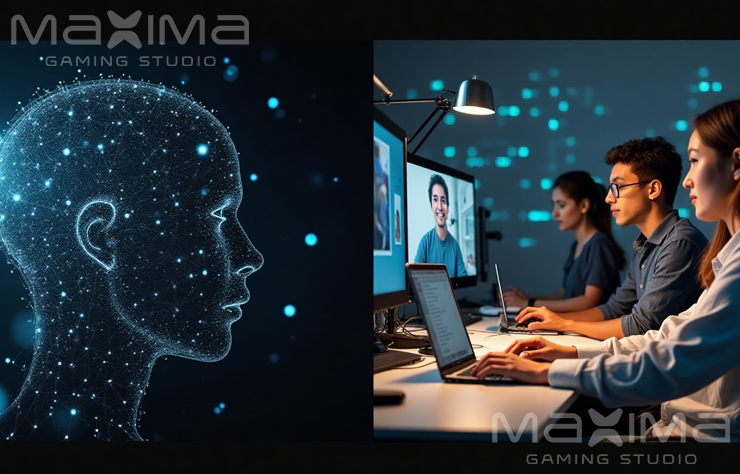 May 13, 2025
May 13, 2025
Will AI Replace Human Game Developers?
As Artificial Intelligence (AI) advances rapidly in the gaming industry, a common question arises among developers and studios: Will AI replace human game developers? This concern is valid and worth exploring in detail. AI has undeniably transformed many aspects of game development, but understanding its real impact on jobs, creativity, and the future workforce is crucial.
In this article, we’ll analyze AI’s capabilities, its limitations, potential effects on different developer roles, and how human creativity will remain vital — providing clarity on job security in this new era.
The Current Capabilities of AI in Game Development
AI today can:
- Automate repetitive tasks like level design, asset creation, and bug testing.
- Generate code snippets and assist in debugging.
- Create dynamic NPC behaviors and adapt game difficulty.
- Generate narrative content such as dialogue or side quests.
These abilities allow AI to speed up workflows, reduce costs, and support developers, but they don’t yet match human creativity and complex problem-solving.
Where AI Excels — And Where It Falls Short
Strengths of AI
- Speed and Scale: AI processes large datasets and generates content faster than humans.
- Consistency: AI can perform repetitive tasks without fatigue or errors.
- Data-Driven Decisions: AI models can analyze player behavior to optimize game balance or monetization.
Limitations of AI
- Creativity and Innovation: AI lacks genuine creativity, intuition, and emotional intelligence needed for storytelling and artistic design.
- Context Understanding: AI struggles with nuanced decisions and understanding complex cultural or social contexts.
- Collaboration and Teamwork: Human communication and collaborative creativity are hard to replicate.
Impact on Different Developer Roles
Game Designers
AI tools assist designers by generating ideas or testing mechanics, but final creative decisions remain human-led. Designers will increasingly become “AI conductors,” guiding and curating AI outputs.
Programmers
Routine coding and debugging may be automated, but complex architecture, optimization, and integration require human expertise. Programmers who adapt to AI-assisted development will be in high demand.
Artists and Animators
AI accelerates asset creation but cannot replace the artistic vision and emotional impact human artists deliver. Artists will focus more on directing AI tools and refining outputs.
QA Testers
AI bots can automate testing extensively, but human testers are still essential for exploratory testing and understanding player perspectives.
New Opportunities and Skillsets
AI will shift the job landscape, creating demand for new roles such as:
- AI Trainers and Curators: Teaching AI systems through data and refining their outputs.
- AI Integration Specialists: Embedding AI into game engines and pipelines.
- Ethics and Compliance Experts: Ensuring responsible AI use.
Continuous learning and upskilling in AI technologies will become critical for job security.
The Future: Human-AI Collaboration, Not Replacement
The most realistic future is a collaborative one. AI will be a powerful assistant, automating mundane tasks and providing insights, while humans bring creativity, intuition, and leadership.
Successful developers and studios will harness AI to amplify human potential — not replace it.
Conclusion: Job Security in the Age of AI
AI is transforming game development but will not replace human game developers any time soon. Instead, it changes the nature of work and emphasizes creativity, problem-solving, and AI management skills.
By embracing AI as a partner and evolving skillsets, developers can secure rewarding careers in the future gaming industry.


